The Best Hotel Accounting Software
Hotel accounting software is essential to maintaining a profitable hospitality business. In this guide, we assessed top systems for functionalities like multi-entity reporting, flexible invoicing, and usability to support independent inns to large commercial chains.
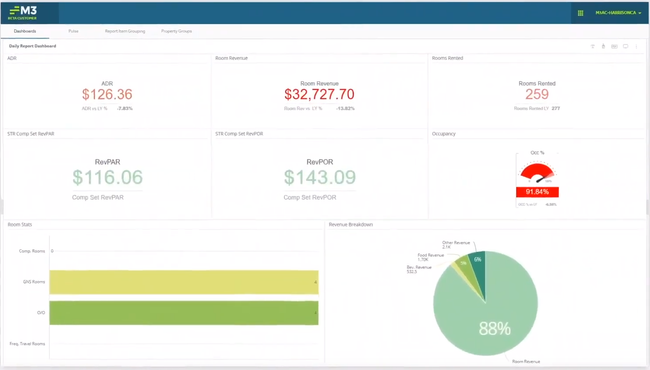
- Supports accounts payable, receivable, and reporting
- Invoicing feature allows scanning receipts and documents into PDFs
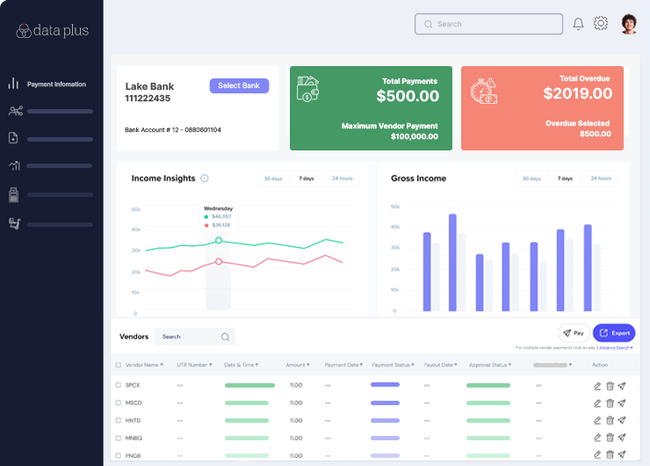
- Industry-specific reporting through DPAnalytics
- Offers over 235 interfaces for integration with PMS, POS, payroll systems
- Multi-currency functionality
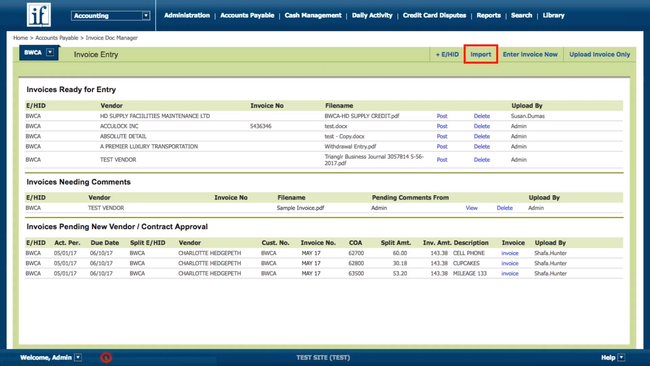
- Customizable labor models
- Built-in automated hotel payroll
- USALI compliant accounting
Hotel accounting software includes a wide range of tools for the hospitality industry, such as flexible invoicing, inventory management, and tracking expenses and multi-entity revenues. We used our advanced review methodology to evaluate top solutions for all types of hotels, from resorts to bed and breakfasts.
- M3 Accounting Core: Best Multi-Entity Reporting
- Data Plus Hospitality: Best for Large Chains
- Inn-Flow: Best for Mid-Size Chains
- NetSuite: Best ERP Option
- Sage Intacct: Best for Franchises
- Xero: Best for Single-Entity Businesses
- QuickBooks Online : Best for Independent Hotels
M3 Accounting Core - Best Multi-Entity Reporting
We like M3 for hotel businesses with multiple entities because of its accounting system tailored to the hospitality industry. Its multi-property management function is desirable for enterprise hotel chains, as it consolidates reporting of all properties across one portfolio. The consolidation helps managers visualize key metrics like revenues, expenses, and cash flow from all properties.
M3 Accounting Core includes multicurrency exchange rates for companies with hotels located globally. Other accounting features include automated check writing, budgeting, and financial forecast creation. Some cons of the system are that it has a dated interface and some users experienced slow reporting.
Data Plus Hospitality - Best for Large Chains
Data Plus Hospitality’s DP pay module streamlines the vendor payment process for large hotel chains managing several vendors with a high transaction volume. The system supports several payment methods, including virtual cards, ACH, integrated pay network, and checks. It integrates directly with the accounting module, helping automate reconciliation by having company-wide vendor payments in one place.
The DP pay module also helps reduce costs. It automatically identifies and flags invoice discrepancies and vendor errors when received, so you don’t have to check every line of your payments manually. This is a cost and time-saver for large chains that can’t manually look over each vendor bill they receive, which can lead to overcharge errors going unnoticed.
Additionally, Data Plus’s DP pay module helps lower fraud risk when issuing B2B vendor payments. The tool offers administrative security controls so only authorized users can access it, ensuring the correct employees make payments through secure channels. It even provides complete audit tracking, essential in ensuring each entity can be audited if suspicious activity arises.
Inn-Flow - Best for Mid-Size Chains
Inn-Flow is a hospitality management and accounting software best suited for mid-sized hotel chains. We found its procurement module effective for auto-calculating purchase orders, letting users create budgets based on periodic automatic replenishment levels, and integrating with its accounting. These features aim to make managing inventory more efficient and less costly.
Inn-Flow also has strong scalability, as businesses with multiple hotels can organize their financial data consistently while monitoring them all at once. It also automates accounts payable, bank reconciliation, and payroll workflows to eliminate manual entry errors. The accounting suite has built-in adherence to the Uniform System of Accounts for the Lodging Industry (USALI), the hotel industry’s standard financial reporting system. We found its lack of public pricing a significant drawback, as businesses must schedule a demo first.
NetSuite - Best ERP Option
NetSuite is a comprehensive ERP system that provides hotel-specific solutions. We found in our testing that its inventory management module works well for the hospitality industry by providing a real-time view of all channels and properties. It can track supplies, amenities, and retail inventory across multiple locations, which is essential for franchises and chains managing many hotels.
The enterprise performance management module helps chains with automated account reconciliation, increasing accuracy and speed while pulling financial data from various sources. This feature is valuable for hotel chains with many different revenue streams that can complicate financial analysis. We recommend NetSuite for mid to large-size hospitality businesses, as the software is expensive.
Sage Intacct - Best for Franchises
We like Sage Intacct best for hotel franchises because of its customizable dashboard and integration capabilities. Its financial reporting dashboard is practical for hotel chains, providing multi-entity metrics, flexible revenue recognition, and automating consolidations from parent companies. These features help franchise owners and managers track financial data from all properties and automate accounting processes.
Sage Intacct is fully cloud-based and can easily integrate with hotel property management and POS systems like BILL or Yooz, allowing flexibility for businesses already utilizing them. Sage also offers inventory management and HR modules from their marketplace, which can be effective for hospitality franchises but come with additional costs for each.
Xero - Best for Single-Entity Businesses
Xero is best for single-entity hotel businesses looking to streamline their accounting processes like invoicing, inventory, and expenses. After demoing Xero, we like their optimized cash flow management features, allowing companies to automate financial statements and inventory processes. The automatic invoicing reminder feature helps minimize payment delays and create a less intrusive billing experience for guests.
Xero allows unlimited users, letting owners collaborate with any number of team members and accountants. The system is affordable; their mid-tier “growing” plan is $42/month. While Xero is effective for single-entity businesses, it does not have multi-entity support for companies managing more than one hotel.
QuickBooks Online - Best for Independent Hotels
QuickBooks Online is effective for small, independently owned hotels because of its optimized mobile app and strong accounting features. QuickBooks Online’s mobile app lets users manage their finances, create invoices, and accept payments on the go. The app is ideal for independent hotel owners who are already on a time crunch and need quick access to their financials. There is also high user praise, with 4.7/5 stars on the Apple App Store with over 185,000 ratings.
Its accounting features include automation for invoicing and payments, expense tracking, and organizing bills. We don’t like that it lacks industry-specific features like daily operating statements and the ability to analyze multiple revenue streams separately. The software is affordable; its “simple start” plan is $30/month but only allows one user.
Zoho Books- Best User Interface
Zoho Books makes our list because of its accounting package, which is easy to use and features integration with Zoho Creator for hotel management. Its customizable invoice feature allows businesses to modify content, which is necessary for hotels that itemize charges like room service and amenities. Zoho Books’s modules are easy to understand due to their simple and modern user interface.
On top of Books, Zoho offers Creator, where users can create custom applications that seamlessly integrate with Books. Users can create a custom room reservation system or an app to manage guest profiles with Creator. In comparison, other software offers integration with HMs; Zoho offers its own, so the interface stays the same. However, ERPs with more features might better suit companies with more than one property or rapidly growing businesses, as Zoho Books is a relatively light software.
What is Hotel Accounting Software?
Hotel accounting software allows hoteliers to track revenue and expenses accurately to maintain a positive ROI and make better business decisions. The hotel industry sees a constant influx of new customers on a daily basis. This means owners need to have a system in place to create many new invoices daily and keep track of last-minute added services (i.e., room service) and incurred damages that need to be charged to the customer’s account. The system also needs to track the costs of complimentary items like travel-sized soaps and instant coffee.
Room rate calculation is also an important part of hotel accounting systems. Knowing the time of the week or time of year with the highest demand for hotel stays helps businesses adjust pricing as needed. Companies can also adjust room prices based on the amenities in a particular room; for example, rooms with king-size beds will be set higher than rooms with queen-size.
The accounting software also helps manage payroll. Hotel owners and general managers can track payroll by specific departments, from housekeeping to front desk personnel or individual employees. The system will track the hours worked to calculate wages and provide tax calculations for your state and federal taxes.
Key Features
- Core Accounting: Track revenue and expenses with the accounts payable and accounts receivable modules. Keep financial records in the general ledger with the chart of accounts, financial statements, journal entries, and more.
- Room Rate Calculation: Automate rate calculation and adjustments based on the day of the week and seasonality. Apply extra charges for room upgrades. Manage block rates for large groups.
- Invoicing: Create invoices for scheduled stays, special event reservations, and charges for room damages.
- Budgeting and Forecasting: Calculate cost per occupied room (CPOR) and generate budgeted vs. actual comparisons to create financial plans.
- Financial Reporting: Create reports on financial data, including profit and loss statements, cash flow statements, and balance sheets.
- Payroll: Track wages for employees in various departments, including front-desk staff, back-office personnel, housekeepers, and chefs.
Primary Benefits
Some of the benefits of hotel accounting systems include:
Streamlined Billing and Invoicing
Hotel accounting software makes it easy to bill for a regular night’s stay, extra services, and special events. If your customers order room service or take stocked items from the minibar, you can add these extras to the final invoice at the end of the stay. Any damages that occurred or stolen items can also be added as additional charges for the customer.
Hotels with conference rooms or other large spaces they rent out for special events must be invoiced appropriately. Not only do you need a system that tracks the cost of the rental space, but you also need to manage room rates for large parties. Customers with large groups can set up room blocks to lock in pricing for a set number of guests.
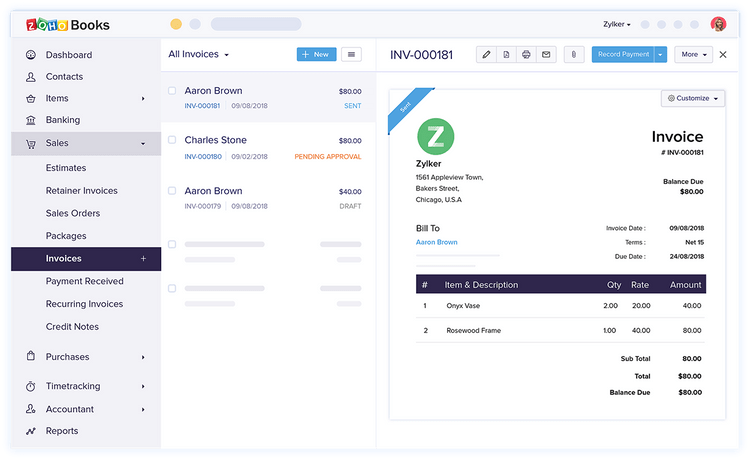
Optimize Your Room Rates
The most optimal price of a hotel room will fluctuate depending on the season, day of the week, and ongoing events in the area. Hotel businesses need to keep their pricing competitive–having pricing too high will drive customers to your competitors. Pricing too low will cost you money. Hotel accounting systems can analyze the current rates of competitors and estimate the demand for hotel stays to help you determine the best pricing for your rooms.
The system will also keep track of room amenities to adjust pricing between the different rooms available in your hotel. Rooms with larger or more beds, whirlpools, or other extra amenities will automatically cost more than basic rooms.
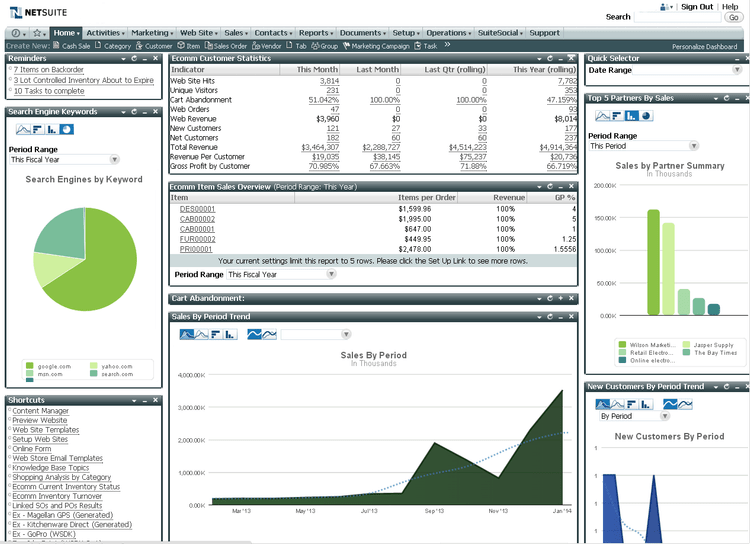
What Does Your Hotel Business Need?
The right accounting software for your hotel business primarily depends on your functionality requirements and the size of your business.
- Small Hotels: Hotel owners that run small inns with only a few rooms generally use generic accounting software like QuickBooks, Xero, or FreshBooks to track income and expenses. Small to midsize hotels with high customer turnover managing many rooms in one location should consider an industry-specific solution. Owners can use hotel accounting software to determine room rate changes and manage additional charges for add-on services and upgrades.
- Multi-Location Hotels: Large hotel chains with multiple locations need all-in-one hospitality management software. Hospitality software allows hoteliers to manage all business operations from one system. In addition to accounting, these systems also manage customers, inventory, reservations, events, housekeeping schedules, maintenance requests, and point-of-sale transactions across all locations.
Business intelligence tools are available in some advanced systems that allow hoteliers to estimate the demand for their hotels in any particular location. BI tools assist owners with making important business decisions like increasing or decreasing room rates or hiring seasonal staff. The system can factor in data from the prices of surrounding competitors, upcoming events, or seasonality.
















































